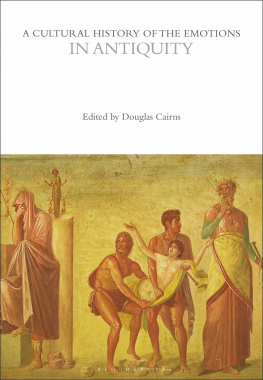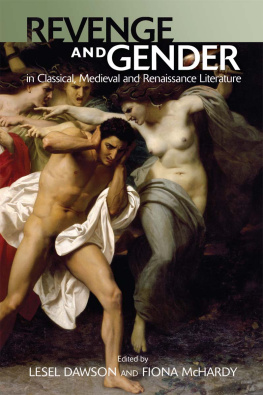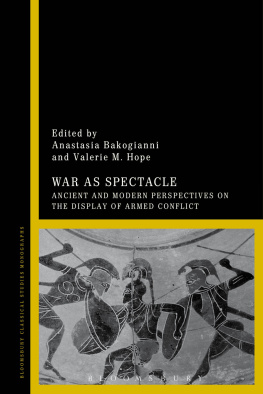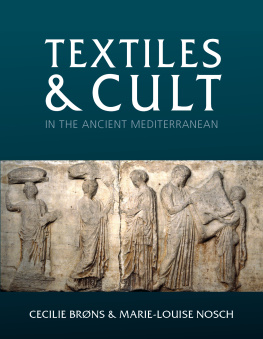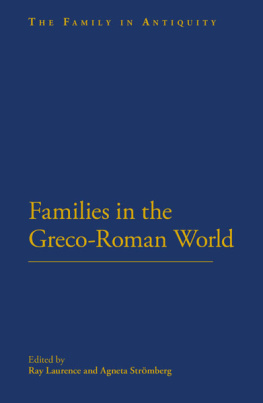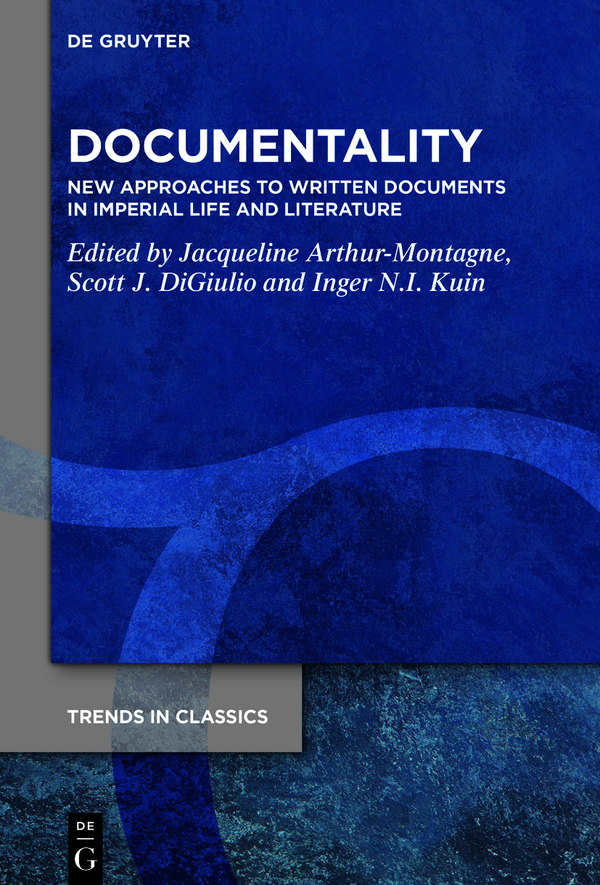Trends in Classics - Supplementary Volumes
Edited by
Franco Montanari
Antonios Rengakos
Volume
ISBN 9783110791778
e-ISBN (PDF) 9783110791914
e-ISBN (EPUB) 9783110791921
Bibliographic information published by the Deutsche Nationalbibliothek
The Deutsche Nationalbibliothek lists this publication in the Deutsche Nationalbibliografie; detailed bibliographic data are available on the Internet at http://dnb.dnb.de.
2022 Walter de Gruyter GmbH, Berlin/Boston
Documentality
Trends in Classics Supplementary Volumes

Edited by Franco Montanari and Antonios Rengakos
Associate Editors Stavros Frangoulidis Fausto Montana Lara Pagani Serena Perrone Evina Sistakou Christos Tsagalis
Scientific Committee Alberto Bernab Margarethe Billerbeck Claude Calame Kathleen Coleman Jonas Grethlein Philip R. Hardie Stephen J. Harrison Stephen Hinds Richard Hunter Giuseppe Mastromarco Gregory Nagy Theodore D. Papanghelis Giusto Picone Alessandro Schiesaro Tim Whitmarsh Bernhard Zimmermann
Volume 132
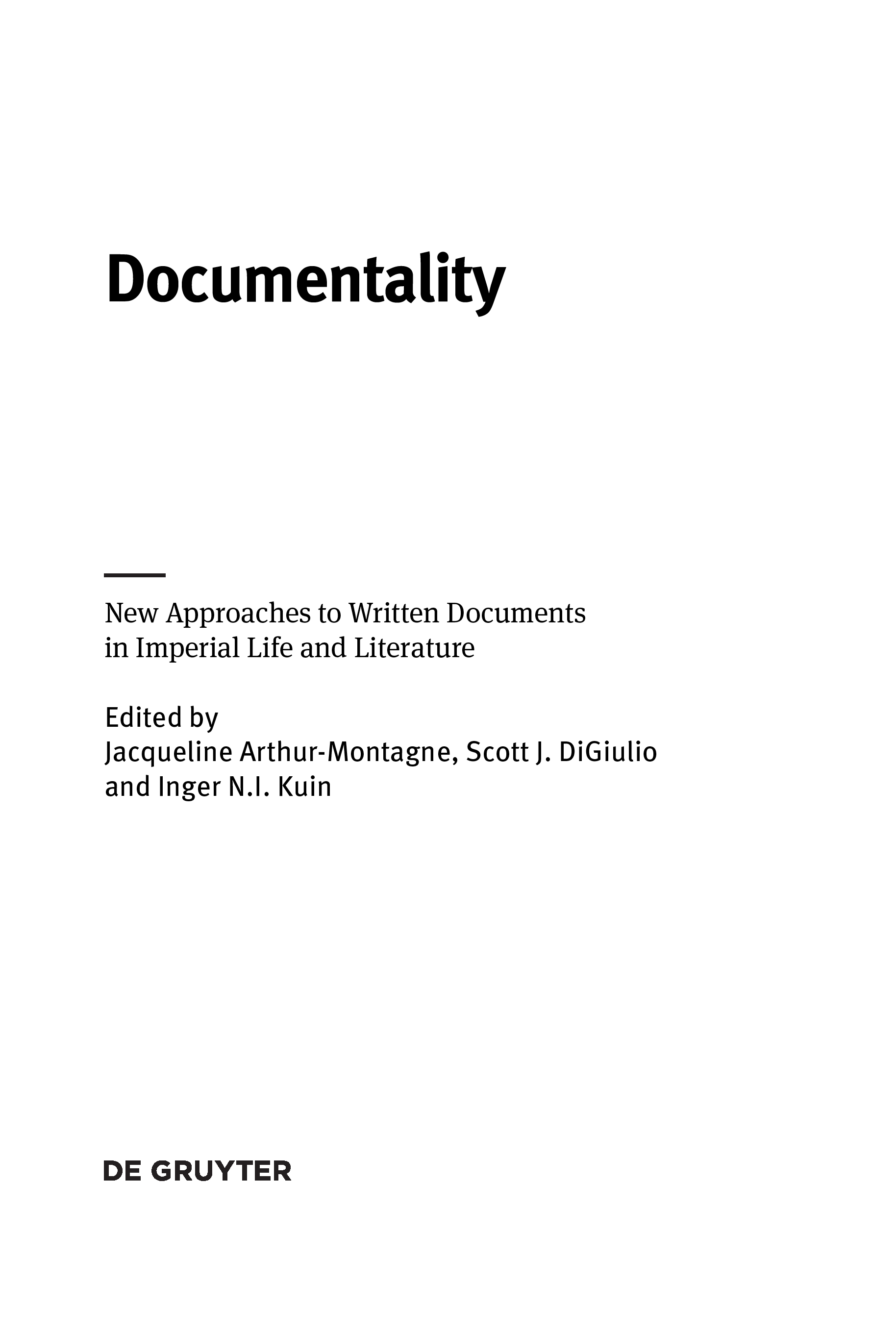
Documentality
New Approaches to Written Documents in Imperial Life and Literature
Edited by Jacqueline Arthur-Montagne, Scott J. DiGiulio and Inger N.I. Kuin
ISBN 978-3-11-079177-8
e-ISBN (PDF) 978-3-11-079191-4
e-ISBN (EPUB) 978-3-11-079192-1
ISSN 1868-4785
Library of Congress Control Number: 2022942765
Bibliographic information published by the Deutsche Nationalbibliothek
The Deutsche Nationalbibliothek lists this publication in the Deutsche Nationalbibliografie; detailed bibliographic data are available on the Internet at http://dnb.dnb.de.
2022 Walter de Gruyter GmbH, Berlin/Boston
Editorial Office: Alessia Ferreccio and Katerina Zianna
Logo: Christopher Schneider, Laufen
Printing and binding: CPI books GmbH, Leck
www.degruyter.com
Acknowledgements
It has taken several years for this volume to come to fruition, and the editors want to thank first and foremost the contributors. We are grateful for their patience, their unwavering commitment to this project, and, most importantly, their willingness to engage in an interdisciplinary dialogue with each other about documents in the ancient world, guided by the modern theoretical concept of documentality. This project stems from a conference held in 2016 at the France-Stanford Center for Interdisciplinary Studies, and we are grateful to the Center for the generous Collaborative Research Grant that they awarded us to organize the conference. We also thank Grant Parker at the Classics Department at Stanford University, who has supported this project from the start. We owe a great debt to Hester Higton, who did a wonderful job copy-editing the manuscript. The anonymous reader for De Gruyter provided many fruitful insights, which improved this manuscript in important ways. We thank the editors of the Trends in Classics Supplementary Volumes series, Franco Montanari and Antonios Rengakos, for their help in seeing the publication of this volume through to the end, as well as the team at De Gruyter Classical Studies. The three of us first met at the Advanced Seminar in the Humanities at Venice International University, where the idea for a project on documents and documentality was born. We want to thank, in particular, its conveners Ettore Cingano and Lucio Milano, without whom this project would not exist.
Abbreviations
Abbreviations in the citations of ancient sources follow the Oxford Classical Dictionary, supplemented with H.G. Liddell, R. Scott and H.S. Jones, A Greek-English Lexicon (Oxford 1996) and G.W.H. Lampe, A Patristic Greek Lexicon (Oxford 1969). Citations of modern scholarship primarily follow the abbreviations given in LAnne Philologique.
Other abbreviations used throughout this volume:
ACO
E. Schwartz and J. Straub (eds.), Acta Conciliorum Oecumenicorum, (Berlin 19141984)
BKT
Berliner Klassikertexte, herausgegeben von der Generalverwaltung der Kgl. Museen zu Berlin (Berlin 1904 )
CIL
Corpus Inscriptionum Latinarum (Berlin 1863)
EDR
Epigraphic Database Roma (www.edr-edr.it/default/index.php)
FIRA2
S. Riccobono (ed.), Fontes Iuris Romani Antejustiniani (2nd edn., Florence 19411943)
IG
Inscriptiones Graecae (Berlin 1873)
IK
Inschriften griechischer Stdte aus Kleinasien (Bonn 1972)
SB
F. Preisigke et al. (eds.), Sammelbuch griechischen Urkunden aus gypten (1915)
TH
Tabulae Herculanenses, as published in G. Camodeca, Tabulae Herculanenses. Edizione e commento (Rome 2017)
List of Figures
.
, 133134, fig. 98 a-b.
Introduction
Jacqueline Arthur-Montagne
Scott J. DiGiulio
Inger N.I. Kuin
In the Roman Empire, documents held a strong sway over everyday life, so much so that the form and implications of the document seeped into the realm of literature as well. Epigraphic monuments populated provinces from Britannia to Mesopotamia and dotted the imaginary landscapes of the ancient novels. Papyri preserve an abundance of real letters written during the same centuries that the epistolary form found new expression in the poetry of Ovid, and in the sophistic collections of Alciphron and Aelian. Although Roman record-keeping and archival traditions had originated from Greek epigraphic practices and the administrations of the Near East, a new documentary consciousness began to take hold under the Empire. Authors in this period displayed a heightened awareness of the authority of documents, and how they could be used and abused by the opportunistic forger. In contrast to surviving works of classical literature, which catered primarily to elite readers, ancient documents including inscriptions, letters, monuments, contracts, laws, and testaments intervened in the public and private lives of nearly everyone.
From the outset of modern philological study, classicists and historians have collected and categorized ancient documentary texts. Their efforts have culminated in the widespread digitization of epigraphic and papyrological corpora and the steady publication of documentary anthologies. Accordingly, scholarly expertise is concentrated at opposite ends of what was, in the Roman world, an interconnected system of documentary communication and production.
This volume unites scholars of ancient history, epigraphy, papyrology, and classical literature in order to reexamine fundamental questions about the document in the Roman Empire. Drawing on recent philosophical theories of the document, the chapters here analyze the form and function of an array of documentary genres, from letters and monumental decrees to school compositions and forgeries. Although the documentary media within this volume are diverse, our contributors focus their analyses on three interconnected topics: the use of documents within Imperial societies, the heightened consciousness of documents among Imperial readers and writers, and the extent to which the latter distinguished documents from literature. Each chapter advances individual claims about documentation within specific genres and contexts, and yet the contributors to this volume achieve broad consensus on two central points. First, the boundary between ancient literary genres and documentary genres of writing appears more fluid than prior scholarship has allowed. Second, documents provoked a greater degree of scrutiny and active engagement in the Imperial period than do the ubiquitous and often unnoticed documents of the modern world.


